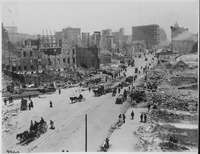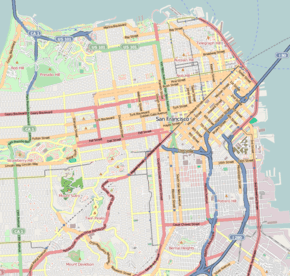Mid-Market, San Francisco
Mid-Market (or Central Market) is a neighborhood and development area in San Francisco, California.
Mid-Market | |
|---|---|
Neighborhood of San Francisco | |
 Earthquake damage at Mid-Market in 1906 | |
 Mid-Market Location within Central San Francisco | |
| Coordinates: 37.780518°N 122.412534°W | |
| Country | |
| State | |
| City-county | San Francisco |
| Government | |
| • Board of Supervisors | Jane Kim |
| • Assemblymember | David Chiu (D)[1] |
| • State senator | Scott Wiener (D)[1] |
| • U. S. rep. | Nancy Pelosi (D)[2] |
| ZIP Code | 94102, 94103 |
| Area codes | 415/628 |
Location
The Mid-Market redevelopment area is centered on Market Street starting at Fifth Street, ending at Van Ness, and including a number of buildings down to Mission Street.[3] It effectively creates a sub-neighborhood of the Tenderloin, SoMa, and Civic Center neighborhoods for the purpose of redeveloping the area.[4]
History
Decimated by the 1906 earthquake and fire, the entire neighborhood was quickly rebuilt and for decades served as vibrant portion of the Market Street corridor.
Noted columnist Herb Caen referred to the neighborhood as 'le grand pissoir' because of the amount of public urination, defecation, and vagrancy due to a consolidation and expansion of homeless social services in the area, starting in the mid-1980s.[5]
2011 Initiative
Past initiatives such as sponsored street murals have had little effect in revitalizing the neighborhood and in 2011 the city government turned to tax incentives to encourage businesses to move to the area.[6][7]
The largest and most noteworthy of businesses to date has been Twitter, which moved into the old SF Furniture Mart building at Ninth and Market streets in 2012.[8] The move by Twitter was initially met with a great deal of controversy,[9] while other businesses such as Zendesk quietly took advantage of the tax break and moved to the area.[10] A number of arts groups, such as the Black Rock Arts Foundation, are working to move to Mid-Market.[11] In October 2013, Square moved its headquarters to the mid-Market area, followed by Uber and Dolby.[12]
Equally transformative, and often attributed to the new density of tech headquarters in Mid-Market, has been the concurrent increase of residential buildings, most notably high-rise apartments and condominium towers.
References
- "Statewide Database". Regents of the University of California. Archived from the original on February 1, 2015. Retrieved March 19, 2015.
- "California's 12th Congressional District - Representatives & District Map". Civic Impulse, LLC.
- Central Market Community Benefit District Archived 2012-01-09 at the Wayback Machine, San Francisco Office of Workforce Development
- Mid-Market’s just another way of sayin’ the Tenderloin, The Tender
- Let’s really remember Mid-Market, The Tender
- Beginnings of a Transformation in Mid-Market, The Bay Citizen
- ‘Twitter effect’ takes hold of San Francisco’s mid-Market area, The San Francisco Examiner
- Changes Take Hold in Mid-Market, The Wall Street Journal
- SF's Twitter tax-break plan spurs political fight Archived 2011-03-26 at the Wayback Machine, San Francisco Chronicle
- Zendesk move to Mid-Market, The Tender
- Burning Man joins Twitter on mid-Market Street in San Francisco, The San Francisco Examiner
- Square moves into new S.F. headquarters
.svg.png)